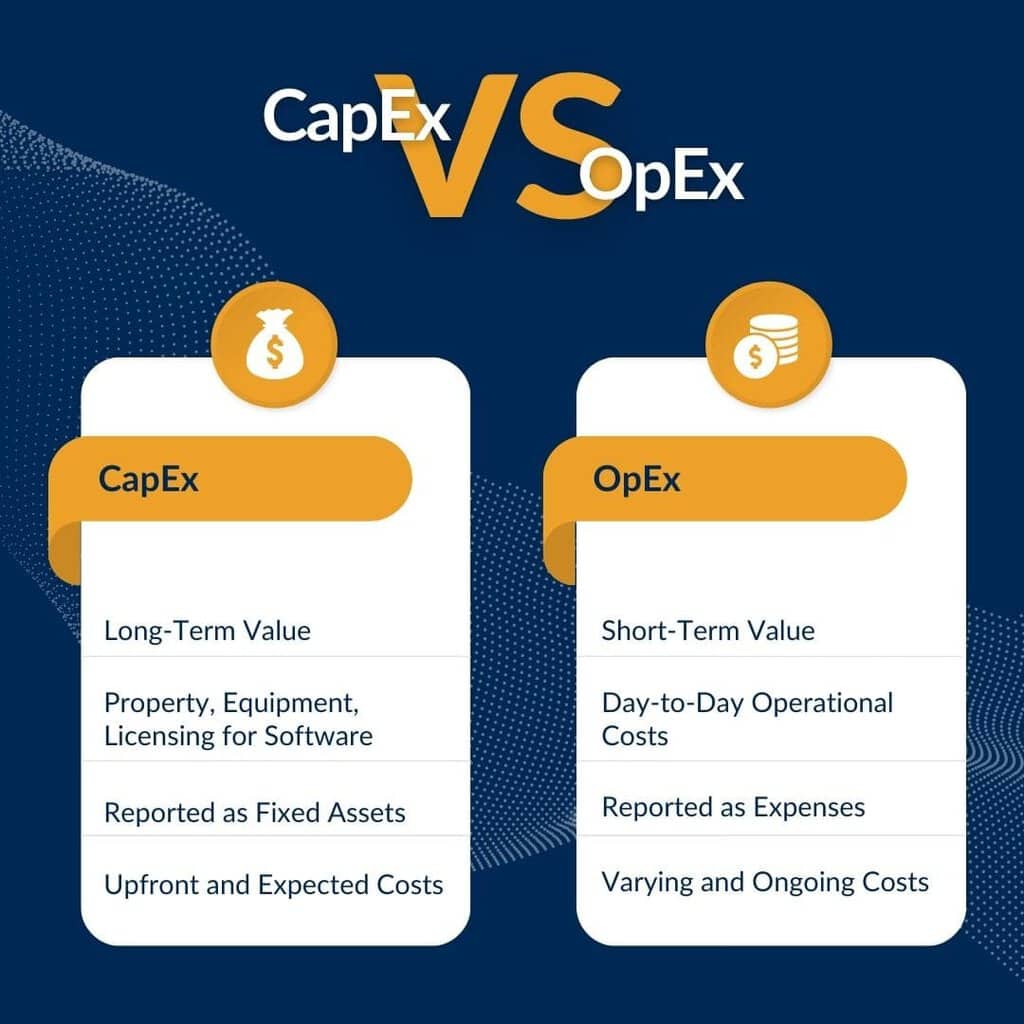
Our previous blog covered your budget and IT environment as a whole. In this blog, we will be talking about the different ways your business can budget.
In recent years, the trend in IT has been to move everything to an OpEx and away from the CapEx that it’s been for many years. This has come in the form of cloud services and per-user/per-server cost recurring yearly for application licensing, rather than one-time purchases (for example, Microsoft Office 365, or moving to other cloud services). There is also the option of buying Windows licenses on premises with Software Assurance, so that continued yearly payment gives continual OS support. But what are the pros and cons of CapEx vs. OpEx?
CapEx Vs. OpEx
There are pros and cons to each option, but the main reason that many businesses enjoy OpEx is because it typically allows them to scale up or down more linearly as they grow or decrease in size. With business being volatile, even companies that have maintained a stable size for decades are growing and shrinking in modern times.
There’s always been one place where this OpEx methodology has been difficult though, and that’s the IT services themselves.
This has been difficult because as businesses grow, more IT people are needed to maintain the systems, and sometimes more skilled people are needed, meaning specialists have to be brought in. Then, if the business shrinks, those people have to be laid off, fired, or retained even if the work no longer justifies their skillset.
This is where Managed IT Services and Cybersecurity Services come into play.
Managed IT Services
Managed Services gives a flat fee per unit (user or device) for management and monitoring of applications, servers, devices, etc. This means as the business grows, you have a predictable cost curve:
“We’re adding 20 more users, which means costs are going up by 20x$$.”
Similarly, when environments need to increase complexity, the MSP provider can bring in THEIR higher-end resources and keep them off your books. That way if the environment contracts for some reason, you aren’t left holding a very expensive group of people on staff – or worse, letting them go.
However, in order for Managed Services to really work, you must be aware of what you’re buying up front. Many Managed Services companies are currently advertising a fixed, flat, per-unit fee – but there are many exemptions in the contract. For example, it’s a flat rate up until a certain number of tickets, or it’s flat rate if you don’t want someone to come onsite. And once these limitations are hit, you suddenly start to see additional charges. We’ve seen companies pay up to double of their original Managed Services contract simply due to “outside of contract” exemptions.
When shopping for Managed Services vendors, there are several things that you want to keep in mind and ask the vendors.
What is the per-unit cost, and what is a unit under the contract? Is it a person, a device, or a combination of the two of them?
What are the hours of operation of the MSP provider? 8×5? 24×7?
What happens when there is an after-hours call? Is that a special rate, or is it included in the contract?
Is patching and basic maintenance included in the contract, or is it only helpdesk?
What about upgrades? New OS versions, new application versions, hardware upgrades – are those included?
What about onsite visits, are those part of the contract? Are they completely excluded, or is it somewhere in between?
All of these different gotchas can cause a lot of pain points when trying to move your business towards an OpEx-based model instead of the traditional CapEx model.
Cybersecurity Services
As the internet footprint of your business grows, it becomes increasingly vulnerable to cyberthreats – like phishing, malware, and hacking. A reliable and secure network should always come first, and your company’s security depends on rigorous data and access management.
To reduce the danger of unauthorized access and data loss, your IT budget should include online security measures like firewalls, password managers, managed detection and response (MDR) services, and multi-factor authentication (MFA). To stay on top of emerging risks, these systems need to be updated frequently, which can be costly. However, incorporating them into dependable operating expenses will simplify the budgeting process.
Comprehensive cybersecurity awareness training is also necessary for your employees. A highly empowered staff (whether working remotely or in a hybrid model) is more successful at detecting and mitigating system problems and cybersecurity breaches.
Easy Transition To OpEx
Mirazon provides a broad array of managed services to help you avoid overspending and optimize IT expenditures. To make a smooth transition from CapEx to OpEx while maximizing your IT budget and market competitiveness, or if you just need some help weighing the pros and cons of CapEx vs. OpEx, contact us below.
Stay tuned for our next blog!
Learn more about making cent$ of IT budgeting!
Need assistance weighing the pros and cons of CapEx vs. OpEx? Our experts are here to help. Contact us by calling (502) 240-0404 or emailing info@mirazon.com.
